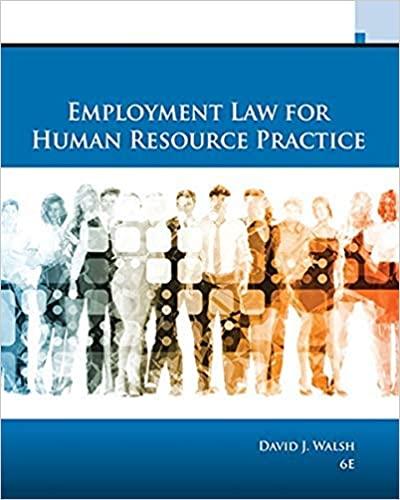A few months after an employee who was hired as a sales clerk at a jewelry store,
Question:
A few months after an employee who was hired as a sales clerk at a jewelry store, she was asked by a customer to perform a transaction that the clerk was not familiar with. Despite repeated tries to complete the transaction, the clerk was unable to do so. Sensing the customer’s mounting frustration, she gave the customer an extra 10 percent discount when she was finally able to complete the transaction. The store’s security officer learned of the unauthorized discount and asked the clerk to accompany him to an interview room, which she did. Two other employees were present in the interview room. One was a female sales manager who, pursuant to company policy, was present because a male security officer was interrogating a female employee. The other was a male security employee who was using a computer in the room to perform a task unrelated to the interview. The clerk sat in a chair and the security officer sat in front of her. The interview lasted fifty-seven minutes. At the outset, the clerk signed a document acknowledging that she understood she was free to leave at any time. The security officer, whose demeanor was described by the clerk as “very gruff, very intimidating,” implied that he had knowledge of her poor credit history. He also stated that there were mistakes in her account book and that there were six pieces of jewelry missing. He accused the clerk of having a drug or alcohol problem and “suggested that she pawned the jewelry to pay bills or to support her drug habit. Several times, the security officer told the clerk not to interrupt him. At one point, he demanded that she stay in the room. The clerk said that she did not feel free to leave and she believed if she had attempted to do so, the security officer would have verbally intimidated her into staying. The woman admitted to giving the unauthorized discount and explained the circumstances. She signed a document stating that she had given the unauthorized discount and was immediately fired for violating company policy. In Indiana, where the case took place, employers are allowed to detain employees or customers for up to two hours if there is probable cause to believe that they engaged in theft. The former clerk sued on multiple grounds: public disclosure of private facts, infliction of emotional distress, false imprisonment, and defamation. What should the court decide on each of these claims? Why? (See Dietz v. Finlay Fine Jewelry, 754 N.E.2d 958 (Ind. App. 2001),
Step by Step Answer:






